new posts in all blogs
Viewing: Blog Posts Tagged with: librarians, Most Recent at Top [Help]
Results 51 - 75 of 371
How to use this Page
You are viewing the most recent posts tagged with the words: librarians in the JacketFlap blog reader. What is a tag? Think of a tag as a keyword or category label. Tags can both help you find posts on JacketFlap.com as well as provide an easy way for you to "remember" and classify posts for later recall. Try adding a tag yourself by clicking "Add a tag" below a post's header. Scroll down through the list of Recent Posts in the left column and click on a post title that sounds interesting. You can view all posts from a specific blog by clicking the Blog name in the right column, or you can click a 'More Posts from this Blog' link in any individual post.

By: Alice,
on 3/11/2014
Blog:
OUPblog
(
Login to Add to MyJacketFlap)
JacketFlap tags:
libraries,
librarians,
Education,
australia,
New Zealand,
*Featured,
Life at Oxford,
Annabel Coles,
ANZ LAC,
library advisory council,
workflows,
Add a tag
By Annabel Coles
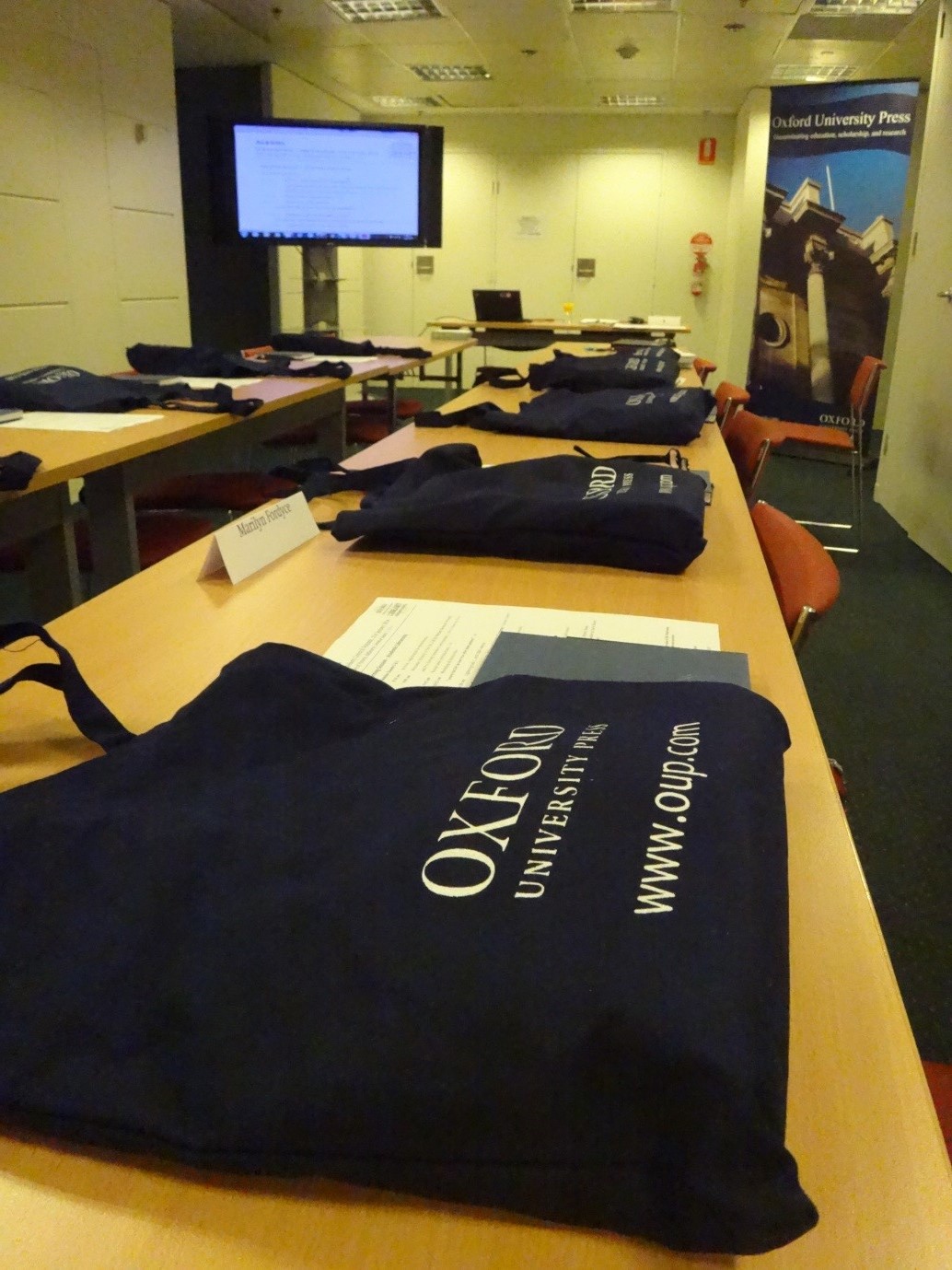
Reading for our first Australia/New Zealand LAC
After months of planning, preparation and final presentation run-throughs, I stood at the front of Seminar Room 3 within the State Library of Victoria, looking across the tables carefully decorated with our OUP goody bags and name placards. It was 8:30 in the morning and I was ready to meet my first librarians from “Down Under”. Back in the office in the United Kingdom, a colleague and I had planned the two meetings (one in the morning for academic librarians, one in the afternoon with state, public, and school librarians) with military precision. The refreshments, the sessions, the materials, the presentations, the timings, even our entertainment at lunch (a local author was coming in to give a lively talk on his book) was planned to a tee. But what you can never plan when dealing with people, and perhaps especially passionate librarians, is how they will respond to those plans…
I was nervous. My colleagues were more relaxed, being based in Australia, they were more familiar with the subtle culture differences; they knew the drill. I, on the other hand, needed to fit in, be approachable, and most importantly I needed to ensure I listened and absorbed everything they had to say so I could fully represent them and their needs back in Oxford, on the other side of the world.
Shortly after 8:30 a.m. the librarians started arriving, one by one, picking up their coffees and muffins, huddling in small groups, and started chatting. I needn’t have worried.
The important thing about these events (which we are labelling our “Library Advisory Councils”) is giving the librarians an opportunity to talk with their peers on issues that matter to most to them, and we, as publishers, have the privileged to be part of those conversations. I learnt early in the sessions that they rarely get the chance to discuss issues that they want to discuss. In their usual meetings they are presented with a specific theme and asked to represent only on that area.
Ahead of the meetings it was really important that we asked what they wanted to discuss, and then we would make that a big part of the day. Of course we also have things we want to update them on — as our “Advisors” it’s important that we are able to give them information on our strategies and plans for the future — but this was never intended to be a sales pitch. We want to give them the stage and sit alongside them in the discussions, rather than it being an “us and them” debate.
For me, this was my first time on antipodean soil, surrounded by librarians who were having good and bad experiences with publishers, and this is my opportunity to do something about it. I felt lucky to sit amongst them and openly eavesdrop (whilst furiously taking notes).
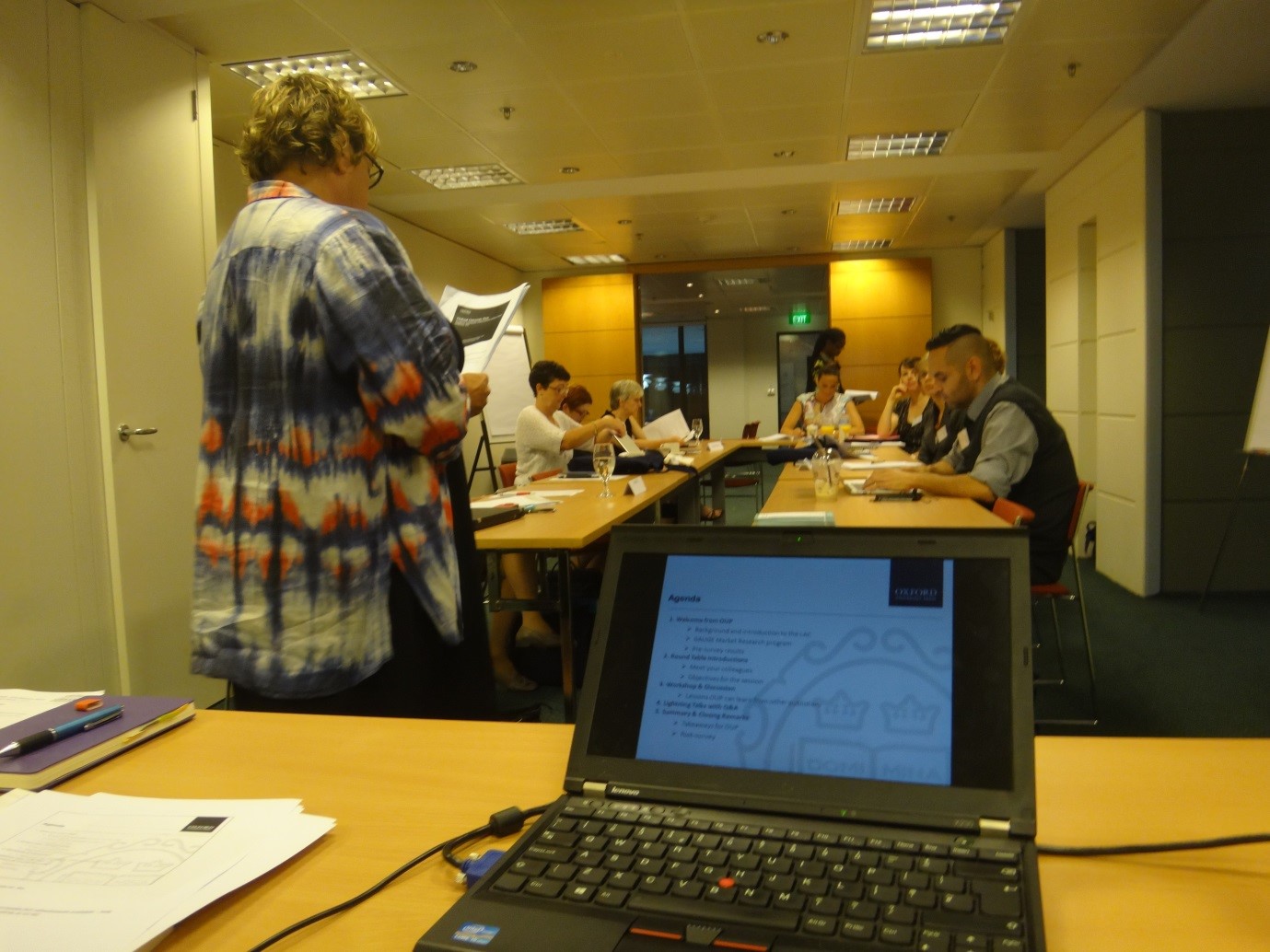
Underway with the LAC
It would be naïve to think that a meeting like this could solve all the problems discussed. Some of the topics discussed were huge hitters that have been discussed and debated in various forms at library conferences around the world over the last few years. It was acknowledged that these issues are larger and more complex than we could possibly hope to remedy within a day. But, as the group were together, the very act of them venting and sharing their experiences enabled them to strengthen their own network and not feel so isolated. It also gave me first-hand experience of their thoughts and feelings on the topic, so that I can now better represent their views when I’m back in Oxford.
Once we got past those larger issues, it was now time to buckle down to get some actionable takeaways: what could we actually impact on a short term basis?
The majority of the actions that I brought away from the sessions were based around workflows: how can publishers work with librarians to make their jobs easier; cut out complexities within processes; and just generally make things simpler. The renewals process is complex and long-winded: what can we do to streamline and simplify the process? We supply our meta-data to discovery service tools but it’s getting stuck with that intermediary for months before finally getting added to their system: so how can we influence our partnerships to move things through more quickly?
Much discussion was had around business models (and we have a Future Business Models group at OUP), including Patron Driven Acquisition and Evidence Based Acquisition. Librarians had both positive and negative experiences and expectations around the impact of those on budgeting and workflows. Again, this was all gold dust to take back to Head Office and sprinkle liberally into the agenda!
So, after brainstorms, lively debate and summarising in groups, I came away with an armful of flipchart paper, covered in ideas, straight from the people who really matter. As the librarians left at the end of the sessions, they were exchanging contact details, thanking us for the day and the opportunity to be involved, and promising to pop by to say hello to us the following week at VALA (a library conference being held in the city).
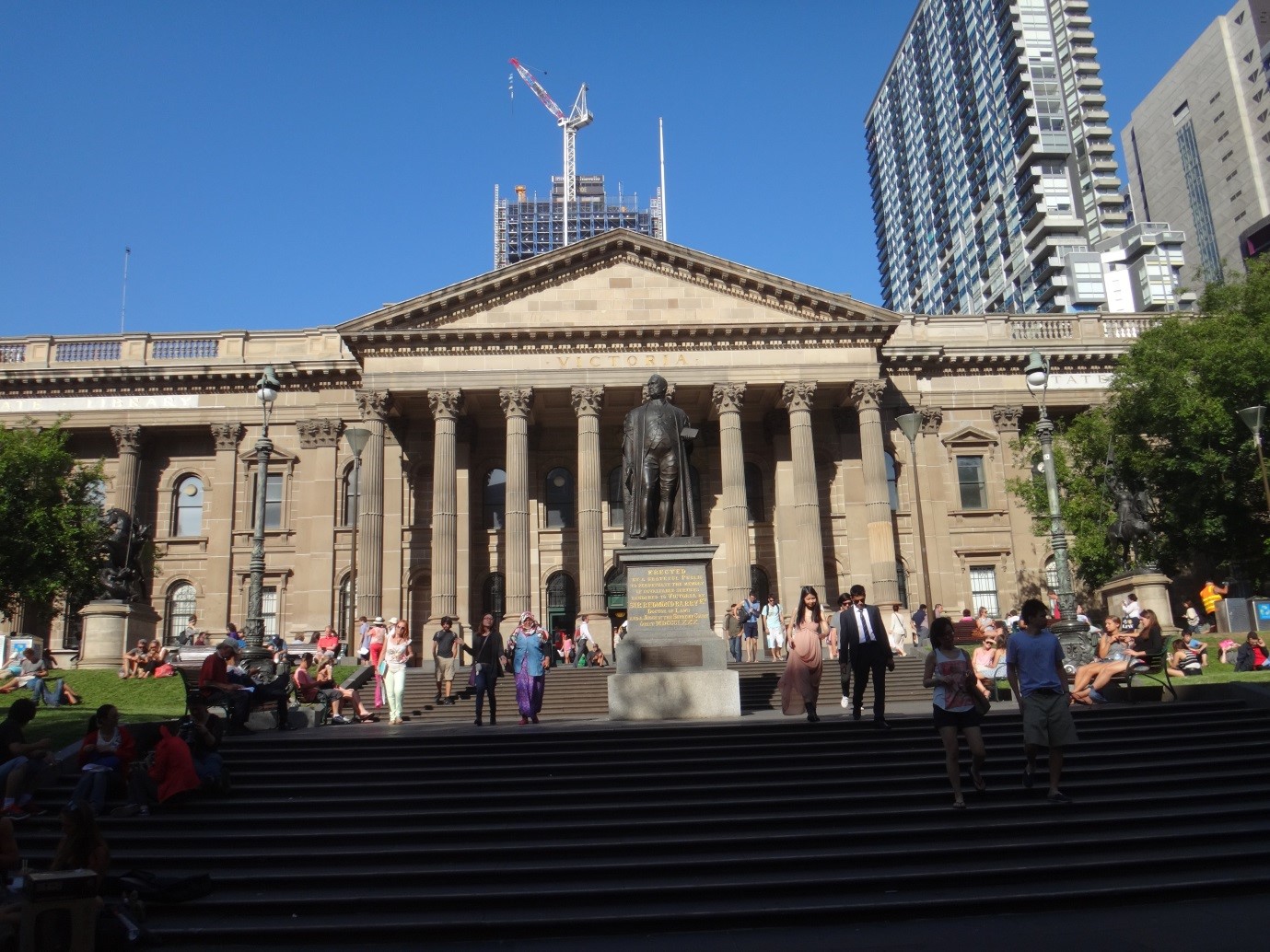
The Victoria State Library, Melbourne
In addition to the fantastic feedback, I have also made some real connections with those librarians on the other side of the world to me — librarians with diverse workflows, audiences, and requirements of publishers. But now, with their voices and opinions still ringing in my ears, my intention is to carry their specific ideas and challenges, the 17000 kilometres across ocean and continents back to the working groups and strategy-makers in Oxford. There, librarian voices from all around the world, whose ideas are communicated through other Library Advisory Councils, will be heard.
Annabel Coles is the Senior Marketing Manager in the Institutional Marketing team at Oxford University Press, promoting our online products and journals to institutions across Europe and Australia and New Zealand. She has held various sales and marketing roles within OUP for nine years.
Regional “Library Advisory Councils” are held within various territories across the world to facilitate conversations with our customers (librarians) on issues that are of mutual interest to ensure that we are feeding back appropriate information and intelligence directly from our markets to our product and platform development, business model and publishing strategies across the business. This provides an opportunity to listen to our customers on their turf, alongside their peers and in their local language and specifically to speak on issues relevant to them in their part of the world. We hope that this will ensure we are bringing the customer voice back into the heart of the products and services we develop within the Global Academic Business. For more, see the OUP Librarian Resource Center.
Subscribe to the OUPblog via email or RSS.
Image credits: (1) Photograph of Steacie Science and Engineering Library at York University by Raysonho@Open Grid Scheduler. Public domain via Wikimedia Commons. (2-4) ANZ LAC images courtesy of Annabel Coles. Do not reproduce without permission.
The post Librarian voices from the other side of the world appeared first on OUPblog.

From Liz Burns re the #ReadAdv Twitter chat for librarians and interested parties:
Our next chat takes place on Thursday, December 5 at 8 P.M. EST.
Sophie and Kelly and I were tossing around possible topics for our next chat, and homeschooling came up. Seems like librarians are always asking about and wondering about working with homeschoolers. What can they do? What should they do? What works?
So I said, oh, we should have guests. And I had a short dream list of possibilities: the two people who, in talking about homeschooling, makes me want to have kids just so I can homeschool them.
They are, of course, Melissa Wiley and Quinn Cummings. And both these terrific women said YES. So Melissa Wiley (@melissawiley on Twitter) and Quinn Cummings (@quinncy) will be joining us on December 5.
Got anything you’d like me to share with librarians who are wondering how best to serve homeschoolers? Wish lists, etc? Send me your questions and I’ll share them this evening, 8pm EST, 5pm here on the West Coast. Follow #ReadAdv to see the discussion unfold.

By:
Carmela Martino and 5 other authors,
on 10/18/2013
Blog:
Teaching Authors
(
Login to Add to MyJacketFlap)
JacketFlap tags:
ALA,
Poetry Friday,
Librarians,
YALSA,
American Library Association,
Teen Read Week,
teen poetry,
Carmela Martino,
April Halprin Wayland,
Elaine Clayton,
Add a tag
.
Howdy Campers and happy Poetry Friday!
Thanks to Cathy of
MerelyDayByDay for hosting today!
(My own poem's below.)
Neither did I, until
Carmela, who is always on top of things, pointed it out.
Teen Read Week is an initiative of
Young Adult Library Services Association (YALSA), which is part of the American Library Association.
Launched in 1998,
Teen Read Week is celebrated annually during the third full week in October. Aimed at teens, their parents, librarians, educators, booksellers and other concerned adults, the continuing message of the
Teen Read Week initiative is to encourage 12- to 18-year-olds to
"Read for the Fun of It." The 2013 sub-theme is
Seek the Unknown @ your library. Check out the FAQs here.
Help raise awareness about
Teen Read Week and library services for teens here.
Can I be totally honest here? Yes, I think I can. I'm out of steam this week, I have only air-popped popcorn for brains right now...
so the only thing I can think to say about Teen Read Week is that teens today are LUCKY, LUCKY, LUCKY that they have so much wonderful literature to read...and that it's FREE at their local library. (Never fear--my fellow bloggers will have lots to say about it in the next few days--stay tuned!)
Hooray for librarians in buses, bookmobiles and buildings small and tall, in towns and fields, malls and halls, for offering teens, 'tweens, kings and queens fine literature to have, to hold, to devour!
This is a medal for all librarians.
I was thinking about the theme Seek the Unknown @ your library. Here's a poem from my teen novel in poems, Girl Coming in for a Landing, illustrated (in collage!) by Elaine Clayton (Knopf) that sorta-kinda fits the theme:
IMPRINTING
by April Halprin Wayland
Today Mr. C told us
about this scientist who pushed a vacuum cleaner
past a brood of ducklings
just as they were hatching
and how after that,
those ducklings followed the vacuum cleaner
everywhere--
nearly glued to it.
Imprinting, he called it.
Which made me think
about last year
that first day of school
and how
I must have been
hatching
just as Carlo
walked past.
(c) April Halprin Wayland. All rights reserved.
Posted by April Halprin Wayland who is grateful for the free photos of the popcorn and the medal from MorgueFile.com

Over on Turbo Monkey Tales this week I look at what I got out of attending the American Library Association's summer convention the last couple of years.
Toodles!
Hazel

By: Brian Minter,
on 7/24/2013
Blog:
First Book
(
Login to Add to MyJacketFlap)
JacketFlap tags:
free books,
Literacy,
school,
librarians,
Books & Reading,
Marketplace,
Education,
Book Recipients,
Teachers,
First Book,
Back to School,
teacher resources,
reading specialist,
First Book Marketplace,
educational resources,
First Book National Book Bank,
National Book Bank,
Add a tag
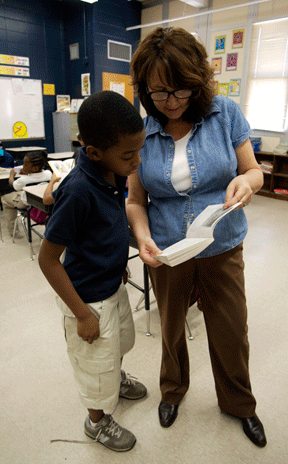 Is there a teacher in your life who works with kids in need?
Is there a teacher in your life who works with kids in need?
First Book needs your help in connecting 5,000 new teachers, librarians, reading specialists and school administrators with brand new books and resources for back-to-school.
Anyone working at a Title I school is eligible to sign up now with First Book (or any program serving kids in need; it doesn’t have to be a school).
Once they’re signed up, they’ll:
1) have access to the First Book Marketplace, where they can find over 4,000 titles, including books for reluctant readers, Common Core resources, Caldecott and Newbery award-winners and graphic novels.
 2) receive regular email updates about new, free books donated by publishers and available through the First Book National Book Bank.
2) receive regular email updates about new, free books donated by publishers and available through the First Book National Book Bank.
Encourage the educators in your life to sign up today at firstbook.org/join.
Or share this message via the social media buttons below.
The post Help Your Favorite Teacher Get New Books for Back-to-School appeared first on First Book Blog.

From everywhere and from different backgrounds and knowledge, we all came together to create this site and I thank you so much! Click on the image to get there and enjoy....
I love it when teachers and librarians understand and recognize the value that author school visits can provide students. Yesterday, I visited Battle Mountain Elementary and Lemaire Elementary in a small mining community in the middle of Nevada. In spite of the five hour drive through the sagebrush covered desert the day before and the five hour drive back after the visit, it ended up being one of my favorite school visits ever.
The school librarian told me ahead of time that the small, out-of-the-way community doesn’t get much in the way of entertainment, so my visit to the school was going to be a big deal. So of course, the teachers, school administration, and students were all excited to have me there. The kids were all engaged in the presentations I gave. They listened. They participated. They laughed when they were supposed to. Even one sweet little girl ran up to me and gave me a hug afterward. All of those were wonderful and added to making it a great experience, but what really made it such a satisfying experience were comments that different teachers made to me at different times after the presentations.
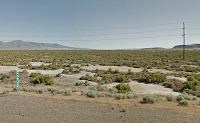
After my
Exciting World of Books presentation, one teacher said something to the effect, “The way you read to the kids with such expression is just what we needed to reinforce what we’ve been teaching with fluency. The kids loved it, and now we can say, ‘See, that’s why it’s important to read with expression.’”
After my
presentation on Story Creation Fun, one teacher made a comment like, “Your segment on showing versus telling is just what we we’ve been trying to get across to our students. Kids don’t always believe or think what teachers teach is important, but when they hear it from an author, then it makes an impact.” Another teacher said, “Thank you for covering the “try-fail cycle. We’ve been working on that and you reinforced what we’ve been teaching. It was perfect.”
This is the effect that I want all my school visits to have. I want to reinforce in a positive way what teachers are trying to teach. I want kids to get excited about reading. I want to help nurture a love for reading in their lives. I not only want to teach kids some of the key aspects of how to write better stories, but I want them to get a feel for how wonderful and fun the story creation process can be.

The real value of an author school visit is not its entertainment value. The real value of an author school visit is the positive, life-changing impact it can have on students, while reinforcing the schools, teachers and librarians’ efforts in a way that no other activity or assembly can.
At
Stephen's Lighthouse today, he links to Kitty Pope's list of what makes a great library worker. I couldn't agree with Kitty's point more:
- Passion
- Flexibility
- Inquisitive life-long learner
- Patience
- Team Playing
- Be positive
- Believe people are good
- Make a difference in the lives of patrons
- Lead
- Communicate
- Innovate
- Market
- Understand and embrace change
I would add: honesty. What else?
I received a request the other day from a school librarian to add audio narration to my book trailer for Old MacDonald had a Dragon. I hadn't seen the need for it before until she reminded me that many of her kindergartners and 1st graders might struggle with reading the captions on my trailer. Great point! So, here's a narrated version of the picture book's trailer. Let me know what you think.
Learned about this story two days ago and by the time I could put something together it has zipped around the internet already. Long story short: blogging academic librarian (and librarian.net favorite Dale Askey) makes negative probably-factual statements about a publisher. Publisher sues librarian and his current employer (who was not his employer at the time of the blog post) for millions of dollars for libel. Not okay, right? While the suit will probably prove groundless, it’s a waste of people’s time and money and an assault on the idea of academic and intellectual freedom. Please inform yourself and spread the word about Edwin Mellen Press’ wrongheaded decision to sue a librarian for writing about his negative impressions of their products.
- I first read about this here. Additional links including the “notice of action” are here.
- Specifics at Inside Higher Ed here
- Read the deleted-but-archives blog post in question here.
- McMaster’s public statement is here.
- A very nice “What can be done” assessment. In short: consider removing any automatic purchases from Mellen Press
- Dale’s blog and his twitter feed
- BoingBoing and Gawker have taken notice.
- If you are the petition signing type, please sign this petition.

Thomas Lannon occasionally posts on NYPLs blog. He is the assistant curator of their manuscripts and archives department. He also figures into this Fast Company story about a time capsule created by a group called the Modern Historic Records Association. The time capsule was never found, not exactly, but this story, an early example of the LOCKSS (lots of copies keeps stuff safe) phenomenon does have a happy ending, thanks to some sleuthing and some librarians.
Find Books that Appeal to Children's Unique TastesEvery child's tastes are different. Too often adults, and even kids’ peers, try to push their own reading interests onto them. Sometimes I would get frustrated when I would see the classics pushed onto one of my sons because it was driving him to boredom and a dislike for reading. Ironically, I would often try to get that same son more interested in reading by finding adventure books and fantasy books for him to read. He liked them okay, but they weren’t his thing. That was puzzling to me since I loved those books and so did my older son. Ultimately, I discovered that he really enjoyed reading about sports. For awhile he read sports books, but now most of his reading is in the sports section of the newspaper or on web sites, and that’s great, because he’s reading.
All my children are readers, but they all have different tastes, which range from the classics to fantasy and adventure to contemporary thought provoking literature and to non-fiction or historical books. Many times children don’t consider themselves readers simply because the world’s supposed view of what reading is doesn’t mesh with their own. The other day my adult niece mentioned that she’s not a reader and that she’s read probably less than 5 books in her life. She listed the books, which were all fiction, but then went on say how she loves to read books that you can learn about things, such as rock climbing and similar things. She’s definitely a reader.
The key is to give children choices in their reading. Just because they don’t want to read the classics or the latest bestselling novel, doesn’t mean they’re not readers. It’s a mistake to force our own interests or likes on them. Instead, we need to help them discover the books or other reading material that will appeal to their unique tastes.
For more insights on the importance of finding books that target children’s specific interests, take a look at the following Librarian Booktalks:
Also, take a look at these resources for book ideas for children.
Image courtesy of Photostock / FreeDigitalPhotos.net
Let Your Children See You Reading
The way that children feel that others think about reading’s importance affects their own reading attitudes. If children rarely see their parents read, they gain the perception that reading is not too important. It develops an attitude of “Why should I read, you never do?” The opposite is true as well, the more children see their parents read the more important it becomes in their minds. This can be especially true for boys in father-son relationships. Whether it’s from cultural or social influences, research has shown that many boy “non-readers” view books as feminine or uncool. That same research shows that as boys see their fathers reading (or other significant male role models, such as grandfathers, uncles, brothers, and teachers), they more than likely will overcome this perception.
Regardless of whether you’re talking about boys or girls, the idea is that children need positive role models that will inspire them to read. When they constantly see you enjoying a variety of good books, it sends the message that “Reading is fun!” “Reading is cool!” “Reading is important!” “Reading is just what I need!”
Want your kids to be readers? First, be a reader yourself.

By: Alice,
on 12/23/2012
Blog:
OUPblog
(
Login to Add to MyJacketFlap)
JacketFlap tags:
librarians,
shelf,
typewriters,
friday procrastination,
*Featured,
link roundup,
northover,
link love roundup,
botanist,
drunken,
jusdanis,
highline,
Add a tag
By Alice Northover
The Christmas rush isn’t limited to retail outlets as the OUPblog and its editors have been busy the past few weeks, so here is our much delayed reading roundup.
In librarians versus the apocalypse, never bet against the librarians.
My new favorite bibliography courtesy of the Drunken Botanist.
Family bringing you down? You’d have had a miserable time with these artists.
The role of auditoriums in the pre-television era. (h/t Paris Review)
Letters from artists complete with paint stains.
Is your library haunted by a ghost of Christmas past?
The Highline and urban spaces.
How do you spell Hanukkah?
Robert Gray on typewriters. (h/t Shelf Awareness)
Harvard’s experimental library.
OED Appeal of the week: party animal.
Utterly marvelous OxfordWords post on John Milton.
David Gutowski’s best music of 2012 lists list is phenomenal.
Georgetown University Press I could kiss you: How to pick a publisher.
A new report on the shifting research methods of historians.
Gregory Jusdanis on intellectual culture in Greece.
Xerox, history, and historiography.
Alice Northover joined Oxford University Press as Social Media Manager in January 2012. She is editor of the OUPblog, constant tweeter @OUPAcademic, daily Facebooker at Oxford Academic, and Google Plus updater of Oxford Academic, amongst other things. You can learn more about her bizarre habits on the blog.
Subscribe to the OUPblog via email or RSS.
The post Friday procrastination: it’s Sunday edition appeared first on OUPblog.

I had another I.N.K. post just about finished when Kelly Milner Halls' plea for school librarians and a package pushed me in another direction.
The mailer came from Carol Sweny, the Henniker Community School librarian, in Henniker, NH, where I had recently talked to kids, K-8. The disc of photos recording my two days there included all the ingredients of a great school visit and reminded me how often a school librarian is at its core.
In the school visit's section of my web site, I have a version of what most authors say on theirs: I find that when kids are prepared for a school visit, they get more out of it. So I ask that students have access to some of my books beforehand, and read (or are read) at least one of them. I also have downloadable pictures of me and book covers to make a poster for your hallway. These efforts alone will invoke kids’ interest and enthusiasm, making the visit more memorable for them.
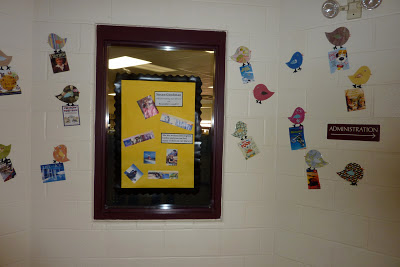 |
| Remember you can click on all these pictures to make them larger. |
This statement isn't an ego thing or a plea to buy more of my books beforehand. When kids know I'm coming, when they have read or heard some of my books, they are psyched to see me. They have had time to think and wonder about things, they listen more attentively, they ask more questions. They get more out of the experience. It's not that I can't grab an uniformed class or auditorium's attention; I can. But time after time, I notice that prepared kids have a better experience. Like Kelly, I know that classroom teachers and principals are overloaded. Some may not even know an author is coming in time to prepare. Besides they are trying to get through their curriculum and whatever enrichments they have planned, let alone teaching to whatever state test is coming up next. PTO parents work hard to raise money for author visits, but their role doesn't usually extend to the classroom or library. The school librarian is the perfect person to rally the troops: to prepare the kids in library class, to suggest and facilitate related classroom exercises, to organize book order forms, to generate excitement.The Henniker has one author come each year, and Carol Sweny makes the most of it. I'm not suggesting that every school or school librarian wants or needs to put in the time and effort she did. Perhaps showing how she rallied her school, however, will remind people how important it is to have school librarians and how much their efforts, with school visits and everything else, help kids learn and grow. |
| Here is part of the flyer Carol made to pass around to the teachers. |
As you saw, grades K through 4 saw a presentation based on my book On This Spot, which takes New York City back in time to when it was home to forests, glaciers, dinosaurs, towering mountains, even a tropical sea. This presentation included, among other things, kids taking many different objects and sorting themselves into a timeline.
Carol asked the teachers to have their classes use timelines to supplement normal learning. They did so in different and wonderful ways. The school's corridors were festooned with examples of this interesting way to think about time and history.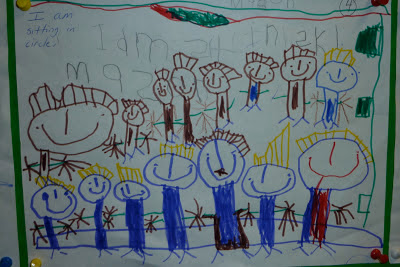 |
| The kindergarteners made timelines of their days. | | | |
 |
| First graders created a timeline that would record a whole year of learning month by month. |
 |
| The 2nd graders made illustrated lifelines. |
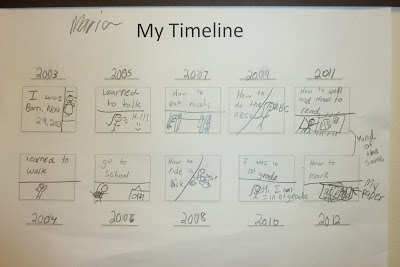 |
| Third graders did their lifelines too. |
 |
| Here's a new way for a 4th grade class to think about the making of the Statue of Library. | |
|
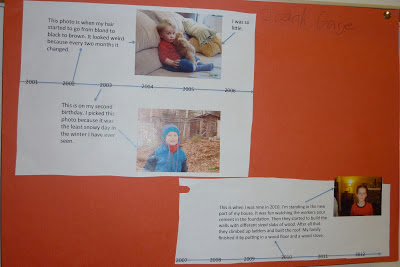 |
| The 5th grade concentrated on learning new computer skills while doing their personal timelines. |
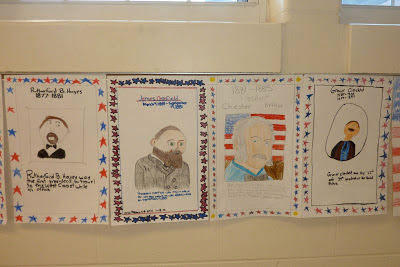 |
| The 6th grades' timeline of our presidents was perfectly timed since my visit occurred shortly after the election in November. |
 |
| The 7th graders learned research and computer skills creating a timeline of Henniker's history that took up an entire hallway. |
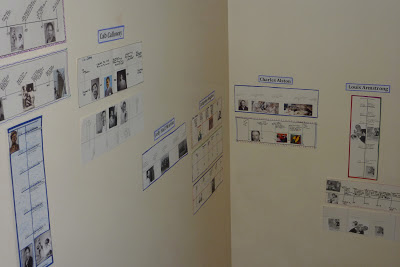 |
| The 8th grade's timeline cascading down the stairway brought their study of the Harlem Renaissance to life. |
|
|
|
As Kelly so wisely said, school librarians (any librarians) are teachers. They build relationships, spark imagination. We should fight for them.
I would fight for Carol Sweny. Besides a great school visit, she gave me a moment of feeling like a rock star. Check out what greeted me when I pulled into the school parking lot.

By: Alice,
on 12/7/2012
Blog:
OUPblog
(
Login to Add to MyJacketFlap)
JacketFlap tags:
metadata,
regina,
chanel,
friday procrastination,
adapt,
*Featured,
link love roundup,
melvil,
273380856280788992,
richardhorton1,
librarians,
Add a tag
By Alice Northover
What happened to 2012? I checked the book room, those weird spaces between the cubicles, and the inexplicable drawers in conference rooms (why would they have stuff in them in the first place). Here’s a week in (my) reading — a particularly librarianish one too.
Are you happy to see me or is that organic compounds in your Martian soil analyzer?
Happy Birthday Texting! Do not fear the telegraph. (h/t Susan Ferber)
Sign language and the lexicon: Crowdsourcing new words for science.
Feeling conflicted about your career choice? It’s common in academia.
Did any of you participate in the Twitter fiction festival?
If so, would you adapt your avatar for signature iconography?
When disaster strikes, there’s no way to call.
Hey sexy librarians! Regina M. Anderson, Melvil Dewey, John Vance Cheney, Sam Walter Foss, and Casanova.
You don’t know metadata.
Chanel is reviving ties with Scotland. Bouclé, vous savez?
The daily life of librarians in Iraq, or how to maintain collections with the threat of car bombs.
Terrifying charts of the digital age. (Only terrifying if you’re trying to adapt to new technology trends)
Can you predict the classic books of the future? (h/t The Millions)
A Boston church is selling a Bay Psalm Book to raise funds.
Benjamin White writes about libraries, copyright, and the digital age.
How guillemots adapt (or die) in a changing environment.
And finally, thank you Richard Horton.
The International Journal of Epidemiology is promoting a campaign to strengthen epidemiology in low-income settings. This is important. Alice Northover joined Oxford University Press as Social Media Manager in January 2012. She is editor of the OUPblog, constant tweeter @OUPAcademic, daily Facebooker at Oxford Academic, and Google Plus updater of Oxford Academic, amongst other things. You can learn more about her bizarre habits on the blog.
Subscribe to the OUPblog via email or RSS.
The post Friday procrastination: why is it December? edition appeared first on OUPblog.

Booktalk Interview with Travis Jonker – Part 3
Part 3 of an interview I conducted with Travis Jonker, an elementary school librarian in Michigan, founder and blogger of 100 Scope Notes, reviewer and blogger for School Library Journal, former judge for CYBILS Awards, and member of the 2014 Caldecott committee.
You mentioned earlier the effect that has come from changes in technology and the rise of eBooks. Tell me other ways that has impacted school libraries.
Travis: Last year I wrote a grant in our school district to purchase eReaders. When it came through, we started a program where students could check out the eReaders and take them home like a normal book. It has been hugely popular. We keep trying to add more to keep up with demand. Whether you’re a school library or public library, there’s no denying that eBooks are going to be hugely important. They’re growing so fast that I think now is the time for libraries to give it a shot.
What were some of your goals with the eReader program?
Travis: One of our goals when we started was to give all our students access to eReaders, especially kids that wouldn’t have access to that sort of thing at home. We felt that a lot of the features of eReaders would be good for students. They can take notes. They can change the fonts. A lot of times the eReader will even speak the words. There are a lot of features, especially for reluctant readers, that might engage the students a little bit more.
With the introduction of your eReader program, did you see a rise in reading with more students reading than before?
Travis: Definitely. We had students who hadn’t had the highest interest in reading before, but were very interested in checking out an eBook and reading it on an eReader device. It’s hard to know whether they were interested in trying something new or if they were interested in some of the eReader features that could make reading a better experience for them. But we had interest from kids who read all the time and from kids who weren’t really readers and hadn’t been checking out books very much. We have a waiting list for all five our eReaders that will take us all the way to the end of the school year. As soon as one comes in it goes out to another student.
What advice do you have for other schools that might want to kick off their own eReader or eBook program?
Travis: A big part is analyzing what you want out of the program. One thing to think about is what you want out of the experience. Do you want it to be mainly for reading? Do you want something where students will have more capabilities, such as from a tablet like an iPad, a Kindle Fire or something like that? That’s the first step. Once you settle on that, based on what your students need, you move forward from there.
I know cost is always a big issue for schools. Do you have advice for how schools deal with that as they look at launching their own eReader program?
Travis: That’s tricky. Our grant came from a local education foundation in our school district. But there are definitely other sources out there. FableVision Learning has an email subscription list that will send you different grants that are available. But in a lot of cases, school libraries are already portioning some of their budgets for digital spending, like databases or online subscriptions. So if a grant won’t work for them, they might need to look at using some of their digital funds for eBooks or eReaders. Or they might want to use a little bit of the money they would normally use on print and put it toward digital. I think more and more school librarians will have to put a little bit more money into the digital side of things.
Any other advice in terms of eBooks and eReaders?
Travis: That’s another situation where I think it’s just good to just jump in and try it. It is growing so quickly. Librarians definitely need to stay current and that’s a good way to stay current.
(Note: Travis recently wrote an article for School Library Journal about his school’s experience with its eReader program, which provides advice and guidance for other schools. You can read the article Travis's Excellent eReader Adventure at www.thedigitalshift.com/2012/08/information-technology/traviss-excellent-adventure-or-how-to-launch-a-thriving-ereader-program-in-a-rapidly-changing-world/)
Booktalk Interview with Travis Jonker – Part 2
Part 2 of an interview I conducted with Travis Jonker, an elementary school librarian in Michigan, founder and blogger of 100 Scope Notes, reviewer for School Library Journal, former judge for CYBILS Awards, and member of the 2014 Caldecott committee.
You talked before about the importance of working with students and teachers in terms of information literacy. Tell me more about that.
Travis: I was telling somebody just the other day that I think this is the craziest time in history to be a librarian. There is so much change going on with technology, especially with eBooks and with resources being available online and for free. It’s just totally changed what the library looks like and what we do.
How do these technology changes tie into information literacy and what you’re trying to teach students?
Travis: Information literacy involves skills that kids will need as they grow up and throughout their lives. So, we’ll work with students doing research projects and I’ll introduce them to some of the different databases that we have online. I also talk to them about formulating guiding questions for their research, such as what exactly is it that they want to answer. I’ll talk to them about being methodical about how they go about answering those questions and being really thorough about it. My goal is to make students self-sufficient in terms of navigating everything that is out there and finding answers to their questions.
What advice do you give other librarians to help students learn how to navigate all the information resources that are available?
Travis: The big thing for me is to just try things. I think a lot of time people are hesitant to try a new project or something with a student because they’re nervous it might not work or the outcome might not be exactly what they want. But I think it’s really important for school librarians to work with students and teachers at every opportunity they can.
Why is it important for school librarians to work with teachers in terms of teaching information literacy to students?
Travis: Collaboration is such a big part of what we do. Sometimes it’s really difficult to collaborate. Everybody has their own things going on. But making those connections would be one of the first things I would tell a new school librarian. You need to keep working with teachers and getting into the classrooms of students that you’re teaching. You can even collaborate without collaborating. Meaning, you proactively look at what teachers are working on and then you look for resources and suggestions that might help the teachers even if they don’t come to you first.
Tell me a little more about the importance of school librarians collaborating with teachers.
Travis: School librarians really are well versed in doing research. They’re well versed in what books might fit with a particular reading or with the interests kids might have. The more times that you can work with a teacher, the better the students will benefit because you’ll be able to share your expertise and what you’ve learned over the years; whether it be working on research or suggesting a great new book to read.
The students won’t learn those things if you don’t make connections with those teachers. There are a lot of times when I’ll be eating lunch in the lounge and through a normal conversation a teacher will mention something she’s going to be teaching and we’ll end up planning to work on a project together. Even though it sounds simple, if that connection hadn’t happened, the students wouldn’t have benefited as much.
I understand that one such collaboration led to a rather unique experience for you. Please share.
Travis: You never know what you might be doing during the course of a day as a school librarian. But a couple years ago when Abraham Lincoln’s 200th birthday was coming up, I mentioned to one of the teachers who was coordinating our school’s celebration that a couple years before I had gone as Abe Lincoln to Halloween. She picked right up on that and before you know it, on Lincoln’s 200th birthday I came riding up to the school in a horse drawn carriage and delivered the Gettysburg Address on the front steps to a bunch of students dressed up in period clothing. We even had all the local news and TV cameras there. It was just the kind of thing where one little thing led to another. And it was a lot of fun.
Read part 1 (Everything is Reading) now and watch for part 3 (eBooks and eReaders in the School Library) of this interview to show up the first part of next week.
.jpg?picon=1806)
By:
Linda Strachan,
on 10/31/2012
Blog:
An Awfully Big Blog Adventure
(
Login to Add to MyJacketFlap)
JacketFlap tags:
picture books,
librarians,
school libraries,
pumpkins,
Linda Strachan,
1st Birthday,
School Librarian of the Year,
Duncan Wright,
Iain Gray MSP,
Add a tag
Exactly one year ago today little Ruaridh FIndlay Thompson's birth was heralded on the front page of the
Scotsman as
'Edinburgh's one in 7 billion' It had been calculated that it was the day the 7 billionth child was born on planet Earth.
Today, on his first birthday, Ruaridh will be getting lots of lovely presents and among the toys will be books. He already has a good library,(shared with his 3yr old sister) of board books and flap books, audio books and beautifully illustrated picture books.
Ruaridh likes to make Brrrumh! noises to the cars in his books, he loves the tactile 'This is not my...' series of books where each page has shiny, soft or bumpy aspects to each page, soft ears on a monkey or bumpy ridges on a tractor's engine. In fact he likes these so much that he touches the images on other picture books to see if they will feel different to the smooth surface of the printed book.
One of the great things about writing for children is that we have a new audience being born every day. That means favourite books have another chance to delight a new audience, and for the children there are also so many wonderful books to discover. If you are interested in Picture Books have a look at
Picturebook Den another collaborative blog by members of the SAS (Scattered Authors Society).
Another place Ruaridh likes to go with his little sister is their local library, to listen to stories and borrow books. When he goes to school it would be great to think that this encouragement to read a wide variety of books, that he is getting from home, will be reinforced in school by the school having a good and well stocked library and a librarian.
Particularly when he gets to senior school, when a lot of children are no longer going to the library with their parents and reading can sometimes be thought of as something you HAVE to do at school, rather than a pleasure.
This is where school librarians come into their own.
 |
| Lobby for School Libraries - Scotland |
Last weekend I attended the Lobby for School Libraries- Scotland, at the Scottish Parliament.
I blogged about this a few weeks ago
on ABBA .
Scottish authors Julie Bertagna, Jonathan Meres, Keith Gray, Debi Gliori, Anne Marie Allan and Sally J Collins were there to support the lobby, many others including Theresa Breslin (who sent a message from Russia) sent messages of support for libraries and librarians. In England there was great support from authors and librarians for the lobby in London on Monday.
In discussions about schools and librarians someone said they felt that English teachers in high schools do not read much or any young adult or teenage books, themselves. Obviously some teachers do and are great champions of books, but in my experience it is usually the school librarian, the person with all that enthusiasm, knowledge and willingness and time to engage with the children outside the classroom and exam pressures, who will manage to find the right book for the right child.
 |
| Linda Strachan, Iain Gray MSP and Duncan Wright -School Librarian of the Year 2010 |
But that is not possible if they have no budget to buy new books or organise author visits or pupil participation in book related events. If school budgets are cut or the money for books, libraries and librarians is not ring-fenced - in some schools libraries and librarians will not be considered a priority-
which eems strange in a time when literacy problems seem to abound and engagement with books for sheer enjoyment is a sure way to encourage reluctant readers.


Hopefully by the time little Ruaridh gets to senior school this will not be a problem! For today he is blissfully unaware of all this and will no doubt have a lovely time with his little sister, enjoying his 1st birthday and his pumpkin birthday cake!
In a Baltimore Post Examiner article, librarian Meredith Myers says she created literary parody song "The Raven Is Hard To Handle" to honor Edgar Allan Poe as well as promote libraries. Fun video with a great message at the end!
You can find out more about Meredith in her website, StandUpLibrarian.com.

By: Molly,
on 10/11/2012
Blog:
the pageturn
(
Login to Add to MyJacketFlap)
JacketFlap tags:
YA,
kidlit,
Books,
Authors,
Picture Books,
librarians,
middle grade,
tween,
YA Books,
preview,
Tween books,
Add a tag
Our NYC-area librarian pals were kind enough to join us last week for an early morning of ferocious book talking, coffee consuming, and oohing and aahing over our upcoming Winter (and early Summer) 2013 titles. It was an oddly hot and humid day to chat about Winter (10 weeks until Christmas…it’s really coming!), but we managed to get into the spirit and of course, had an absolutely lovely time.
A few snapshots:

Balzer + Bray VP and Co-Publisher, Alessandra Balzer, holding ELVIS AND THE UNDERDOGS, by Jenny Lee, and THAT IS NOT A GOOD IDEA! by Mo Willems.

Editorial Director Tara Weikum with CITY OF A THOUSAND DOLLS by Miriam Forster, and Executive Editor Erica Sussman with THE MENAGERIE by Tui Sutherland and Kari Sutherland, and MIND GAMES by Kiersten White.

Greenwillow editor Martha Mihalick with the stunning and creepy cover for ARCLIGHT, by Josin L. McQuein.
Our editors have truly outdone themselves with this season’s crop of really terrific “This Meets That” book descriptions… :
Lo and behold, a new Preview blog post feature! These are books that, when mentioned, garnered an across-the-room-audible “awwwww!” from the audience:
- AMELIA BEDELIA– 2013 is the 50th Anniversary of our favorite mixed-up but wholeheartedly well-meaning friend Amelia! We’re reissuing the original picture book in a bit larger trim size with truly fantastic additional back matter.
- TIPTOE JOE, by Ginger Fogelsong Gibson, illustrations by Laura Rankin — I won’t spoil the payoff of this adorable picture book, but let me just say, you’ll lay your hand over your heart when you get to the end.
- GIANT DANCE PARTY– written by THE Betsy Bird! Illustrations by Brandon Dorman.
- RAMONA– We’re repackaging the entire beloved Ramona series in 2013, and let me tell you, the art is adorable. The consensus in the room (and from Beverly Cleary herself, of course) was that this is true Ramona- goofy, a bit scruffy, and every bit lovable.
And that, my friends, is the inside scoop!

By: shelf-employed,
on 10/8/2012
Blog:
Shelf-employed
(
Login to Add to MyJacketFlap)
JacketFlap tags:
Non-Fiction Monday,
easy reader,
E,
Advance Reader Copy,
libraries,
librarians,
nonfiction,
careers,
series,
Add a tag
It's been a while since I've seen a new book about my profession. When I learned that Scholastic was putting out a new book, I asked to see a copy, and they obliged.

Shepherd. Jodie. 2013. A Day with Librarians. New York: Scholastic.
Part of the Rookie Read-About Community series, this small (roughly 7"x7") "easy reader" contains basic facts about librarians, their varied duties, and their workplaces. Information is conveyed in simple black font on a white background with a photograph on the facing page.
The "front desk librarian," the one described as using a scanner to check out books and noting when they need to be returned, isn't too common in the public library system in which I work, but I imagine she may be more common in school media centers or smaller libraries.
Statistically, the photos depict a greater diversity in our profession than actually exists, but reflect the change that librarians (and other forward-thinking professions) are striving to create - a more diverse membership. Hopefully, young readers will see themselves in these pages and think about librarianship as a career (no, we're not becoming obsolete).
In addition to five small "chapters," A Day with Librarians includes tips on being a community helper, an index, additional facts, and an "about the author" section.
From the "Meet a Librarian" chapter,
Librarians have important jobs. They can help you find a good book to read or some information about almost anything.
That about sums it up. I'm good with that.
Other professions featured in the series are doctors, firefighters, mail carriers, paramedics and police officers.
A colleague posted this link from
All Things Mothering and I can't help but agree. Especially about the water. So true...and it's magical too!
Image: 'Whatâs cooler than being cool?' http://www.flickr.com/photos/31246066@N04/4345271118
Found on flickrcc.net

We get it. Times are tough. The public sphere is shrinking in the US and elsewhere. Libraries are around and open, doing stuff. Their funding cycle is cyclical and short and up to the whims of various people, sometimes mysterious. The public library system belongs to everyone. There is a lot to talk about; a lot of things happen there. Many people have strong opinions about how public spaces are used and public money is spent and about the library in specific. You have a 24 hour news cycle, with pages or screens to fill. That’s terrific. We’re often happy for the attention.
At the same time, there are a few tropes that do none of us any favors. You look like people who haven’t done your research or who go for the easy cliche and we look like people who can’t take a well-meaning joke (which we’ve heard for the thousandth time). Let’s get to a place where we’re all feeling good about the whole endeavor. Here are some suggestions. Hope this list, patterned off of How Not To Write Comics Criticism, is helpful. It’s called
How Not To Write About Libraries
1. Your library joke is tired, even if it’s new to you
It is almost impossible for you to make a library play on words that has not been done a million times before, even something that sounds contemporary like riffing off of “adult graphic novels”. You’re probably annoyed that you got the job writing about the library funding crisis but don’t take it out on us. Notify the headline writer also, please. We know you’re doing your best but we should never see “turns the page” or “starts a new chapter” when a new building is built or a librarian gets a new job, retires, or dies, or any sort of bun/shush/dewey/cat pun again ever. That “Overdue book returned years late” story? Heard it. Thank you.
2. Quit it with the wardrobe policing
You try working nights and weekends in a landmark building with a heating and cooling system that dates back to Carnegie times. Dressing in wool and layers is practical and smart, as is keeping your hair out of your face when you might have to crawl under a desk to fuss with a computer. Sixty-four percent of Americans wear eyeglasses, that number jumps to 90% after age 49. We’re not absurdly myopic from all that reading, we’re normal. Saying “OMG they can be sexy too!” is not actually a good response to this; as professions go we’ve always been pretty anti-censorship and sex positive.
3. We’re not all women, not even close
In 2008 the gender split among new grads was 80% female, 20% male. Last year it was more like 78% to 22% and the female/male gap is shrinking. We come from many ethnic backgrounds and we speak many languages. We date and marry people of many genders. A good number of us are just out of library school and share the characteristics of other people in our cohort: tattoos, body jewelry, a penchant for cocktails. Many of us are not just out of library school and enjoy the same things. Nothing unusual. Diversity of all kinds is important in any sort of public service position when you work for the entire public; please try to respect and represent the diversity of our population as it exists in the actual world not as it existed in the movies thirty or even fifty years ago.
4. Many different people work in a library building
This frequently comes up when there is a crime or another scandal at a library and someone gets interviewed who is invariably called “a librarian” and is later revealed to be a page, a volunteer, or maybe just an interested and chatty patron. Librarians (usually) work in libraries, but not everyone who works in a library is a librarian. There are many schools of thought on the importance of these distinctions and while we don’t expect you understand the subtle nuances of the differences between a reference librarian and a cataloger, or a circulation clerk and a shelver, it’s simply important to know that there are many different jobs within the library and not all of them are “librarian” and if you are not sure what the job title is of the person you spoke with, you should ask them. Many professional librarians, though not all, have Master’s degrees from accredited institutions. People call this level of graduate education “library school” and graduates have degrees ranging from MLib. (mine) to MSIS to MLS to MLIS.
5. There are some amazing things hidden in special collections
…and your chances of getting to see them diminish if you continually represent library archives as dusty, musty, smelly, unkempt, or populated entirely with hobbits and wizard-beings, strange and unknowable creatures unschooled in human customs. Introduce yourself and spend some time there and you’re likely to see some amazing things and learn some nifty things about your location, your neighbors or your academic institution.
6. No one with any credibility thinks “It’s all on the internet” and there are reasons why it isn’t
This is an untrue straw man argument, so you don’t have to keep bringing it up. There is a strong case to be made that the push for increasing digitization will be a net good for a society that is increasingly looking to satisfy their information needs online. However we are far from that point now, the digital divide is real and formidable. The vendor-based silos of information which are inaccessible without a payment or a password vex us as much as, if not more than, they vex you. We are trying to help people access the information they want and need. We’re sorry that the shift to digital content is causing trouble for some businesses’ bottom line, but we’ve always been publishers’ best customers and that will change only if they force it to. We would prefer that digital rights management were less onerous too. We would be happy to talk with you at length about why it’s easier to buy something from Amazon.com for personal use than it is to borrow it from the library on your Kindle. Blame copyright and capitalism, not the library.
7. The money thing is complicated, take some time to understand it
Libraries are funded differently from state to state and sometimes from county to county. Reporting on a funding “crisis” when it’s just a possible budget adjustment does us all a disservice with the “sky is falling” approach. Giving people real information about what is happening with and to the budget, and why, would be a great service. More information less doomsaying please. And, as always, if you need the numbers we’ll be happy to give them to you. They’re public. Public libraries have regular meetings of the library board that are open to the public and worth attending if this sort of thing piques your interest.
8. Not all libraries are public libraries
I work in a public library and so I fall into this trap myself. The public library system in the US is a sort of amazing decentralized mutual aid sort of creation, but it’s not the only library system in the US. School libraries and academic (college and university) libraries and law libraries and medical/hospital libraries and other special libraries all have their own systems and procedures and governing bylaws and mission statements and professional associations. Make sure that you are not reporting on one and ascribing it the values and traditions of another entirely different type of library.

9. The entire public is welcome in the public library
…including types of people you may dislike or find distasteful. And possibly including people who find you distasteful. With few exceptions people who are spending entire days or weeks in the library or who are looking at things on their computer screen that people might feel they should be viewing in private are doing so because they lack better or more genuine options. This is a larger societal problem and we are trying to help, making the best of a difficult situation within the structure of our mission statement and policies and procedures. The situation is complicated and deserves a better treatment than the usual “Porn in the library!” headline-grabbers.
10. Libraries are full of joyful noise
Not always, but often enough to say goodbye to the tut-tutting and the shushing and the QUIET PLEASE canards. While we try to have spaces that can accommodate quiet reading as well as rambunctious storytimes and group projects, libraries’ approaches to this are as varied as our buildings. Libraries are more popular than ever by most measures of library popularity and are still tremendously well-loved cultural institutions that are available to and for every single person. The reports of our demise have been greatly exaggerated, especially on the internet.
However it is true that most of us like cats and mostly do not hate Wikipedia.
Here are some more pointers to places to get good, factual information about libraries in the US.
- ALA’s Library Bill of Rights
- ALA Library Fact Sheets
- ALA’s research and statistics section including the Library ROI bibliography
- IMLS (Institute of Museum and Library Services) reports
- ALA’s State of American Libraries report
- Library Journal’s Placement and Salaries Survey
All images come from the Library of Congress’s Prints & Photographs Online Catalog and have no known restrictions on publication. Article specifically inspired by this tweet. Thanks to Andy Woodworth for reading the draft.
From the @ your library site site:
Nominations for the 2012 Carnegie Corporation of New York/New York Times I Love My Librarian Awards are open through September 12.
10 librarians each will receive a $5,000 cash award, a plaque and $500 travel stipend to attend an awards reception in New York. In addition, a plaque will be given to each award winner’s library.
Recognize the accomplishments of your exceptional public, school, college, community college, or university librarian.
Surely you know a deserving public, school, or academic librarian!
Nominate her/him today!
Lord knows we don’t do it for the money! It’s all about the love. ;)
View Next 25 Posts









 Is there a teacher in your life who works with kids in need?
Is there a teacher in your life who works with kids in need?





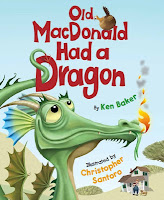






















Beautiful poem, April. Is there anything better than going to the library with no particular book in mind and exploring the stacks for something to read? What treasures there are to find.
April,
Thank you for sharing information about Teen Read Week. I am always a little envious of all of the amazing literature available to teens today.
I enjoyed your poem. I guess possibly imprinting can have many meanings. Definitions are in the eye of the "definer." Your poem instantly made me feel as if I were sitting in a classroom as late middle or early high school student.
Thanks for sharing,
Cathy
The ending of your poem is such a kick in the gut, and what a reminder of teenage years!
Thanks for sharing the poem and making me smile with the duckling video.
I was fascinated by the concept of "imprinting" when I learned about it in college (I think). And I think there are a few times in human lives - as your poem indicates - that we also have imprinting going on. Thanks for sharing the video. Too cute! Hope he finds his mom though! That was one of the dangers of imprinting - finding the wrong thing!
Hi, April--
A poem that good doesn't have to "fit" any theme. Beautifully done and reminds me to get your book into the hands of my daughter.
Thanks for a great post!
Oh, that duckling! What a perfect accompaniment to the poem!
Dear Laura, Cathy, Tricia, Donna, Heidi and Ruth, THANK YOU for your comments! I'm happy this poem gets its time in the sun. :-)
Hello there April, your poem made me smile. :) Love the subtle effects of imprinting, and how it IS indeed deeply connected to adolescence and first loves! :) Thank you for letting us know about Teen Read Week! :)
April, I like the turn in this poem. Thank you.
I loved your book when I first read it, & now you remind me that I need to lend it to some students again! It is Teen Read Week & I've given a few book talks just for that purpose, new and old-lots of wonderful books are available. Thanks April!
April-- the air-popped popcorn for brains image is perfect, and one I can relate to!
And I love your poem. It says so much in so few words! Those poor ducklings, though, imprinting on a vacuum cleaner. Maybe you could turn the story into a humorous picture book?
Dear Myra, Joy and Linda,
<3 <3 <3!
Imprinting has always fascinated me.
Carmela--maybe you're right about the PB idea. Hmmmm...I've put it in my "hot idea" file.